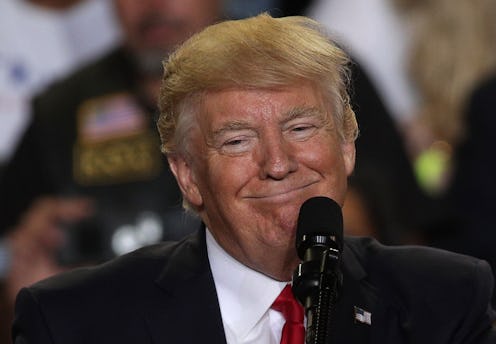News
Trump Thinks Andrew Jackson Was Alive During The Civil War

The president has made yet another blunder. In an interview on the Sirius XM radio show Main Street Meets the Beltway aired on Monday, Donald Trump made some bizarre comments about Andrew Jackson, arguing that the the seventh U.S. president was "really angry" with what he saw happening during the Civil War. For the record, Jackson died 16 years before the war even started. President Trump first appeared to acknowledge that Jackson's time was before the Civil War, but his comments immediately afterward suggested otherwise. Trump also went on to offer that Jackson would have been able to prevent the war altogether.
“I mean, had Andrew Jackson been a little later, you wouldn’t have had the Civil War,” he said. “He was a very tough person, but he had a big heart. He was really angry that he saw what was happening with regard to the Civil War, he said, ‘There’s no reason for this.’"
Since Trump appeared to be under the impression that Jackson was dismayed by witnessing the Civil War, perhaps Trump was suggesting that had Jackson's presidency — not his life — taken place "a little later," the war would've never transpired.
Trump then wondered why the Civil War ever happened. “People don’t realize, you know, the Civil War, if you think about it, why?” he asked. “People don’t ask the question, but why was there the Civil War? Why could that one not have been worked out?”
Trump's comments on Jackson are baffling for a number of reasons. Putting aside the fact that Jackson wasn't around to see the war, when one looks at the former president's record, Trump's notion of Jackson as someone who would've put a stop to the conflict between the North and South only becomes more far-fetched. Though Jackson, a soldier who fought during the Revolutionary War, frequently spoke of the need to put sectional, regional issues aside in favor of solutions that benefited the United States as a whole, his presidency failed to quell the anger and division between the anti-slavery North and the slave-owning South.
In fact, the decisions Jackson made during his years in office only served to exacerbate the problem. A plantation owner who held hundreds of slaves during his lifetime, Jackson's responses to conflicts between abolitionists and supporters of slavery were always in favor of the latter.
On July 29, 1939, newspapers and pamphlets created by the American Anti-Slavery Society, an abolitionist group founded in New York, arrived in Charleston, South Carolina on a steamship. The materials were addressed to leaders in the religious and civic communities but were never delivered — Alfred Huger, the Charleston postmaster who supported slavery, chose not to distribute the mailings. The situation intensified when the sacks of newspapers and pamphlets were stolen by a group called the "Lynch Men," who then led roughly 2,000 people in a celebratory burning of the materials.
Though Jackson reacted by asserting that the postmaster and other federal officials had "no power to prohibit anything from being transported in the mails that is authorized by the law," and that participants in the mob deserved to be punished, he also angrily vilified the abolitionists as "monsters" and subsequently pushed laws criminalizing the mailing and distribution of such "incendiary publications" in the South.
His administration also implemented a gag rule on the House of Representatives barring discussions on abolishing slavery, which effectively ignored over 130,000 citizen-drafted petitions demanding an end to the institution. The Jackson administration's attempts to shut down discussions on slavery only led to mounting resentment from abolitionists and increasing tension between the North and South. So while he may have preferred that the country remain united, Jackson's loyalty to the South and its slaveholding ways, as well as his ineffective ways of handling the division during his time in power, makes Trump's suggestion of Jackson being capable of stopping the Civil War hard to swallow.
It's also worth noting that while Jackson is often described as having been a "benevolent" slaveowner who treated his slaves humanely, the argument that one can "humanely" deny another human being freedom and treat them as property is highly flawed. Not to mention the fact that Jackson's reputation of having been all that humane is dubious, especially considering that he once put out an ad offering a reward for finding one of his runaway slaves, which included the line, "ten dollars extra, for every hundred lashes any person will give him, to the amount of three hundred."
One thing's for sure — Trump is definitely going to learn a lot about Andrew Jackson today.